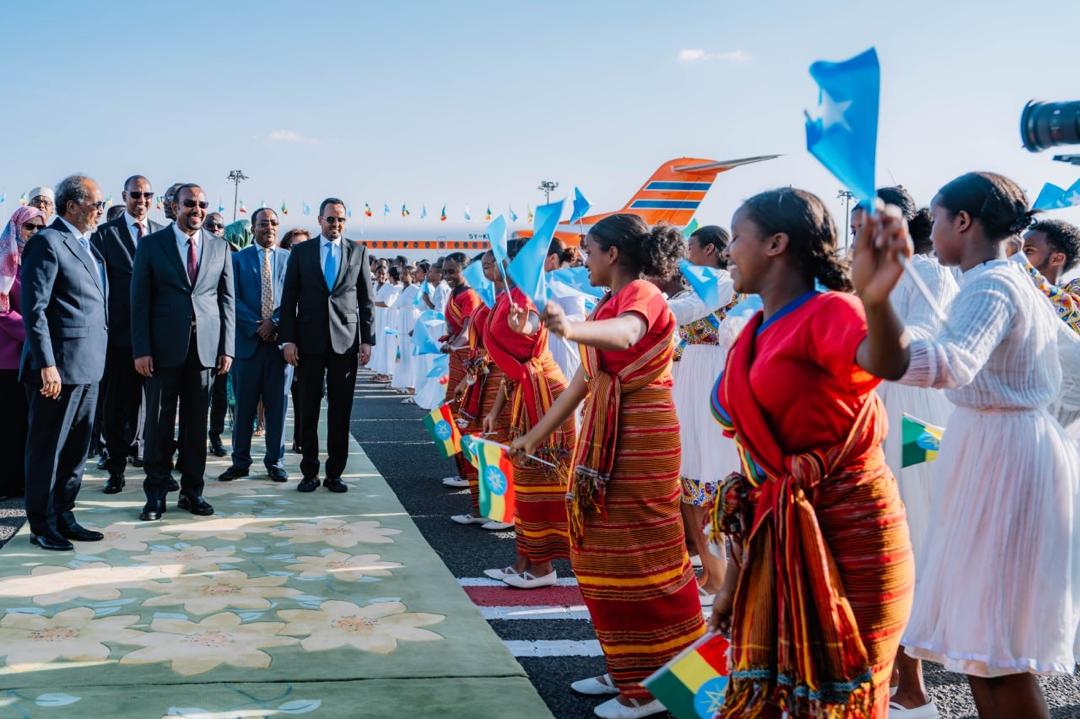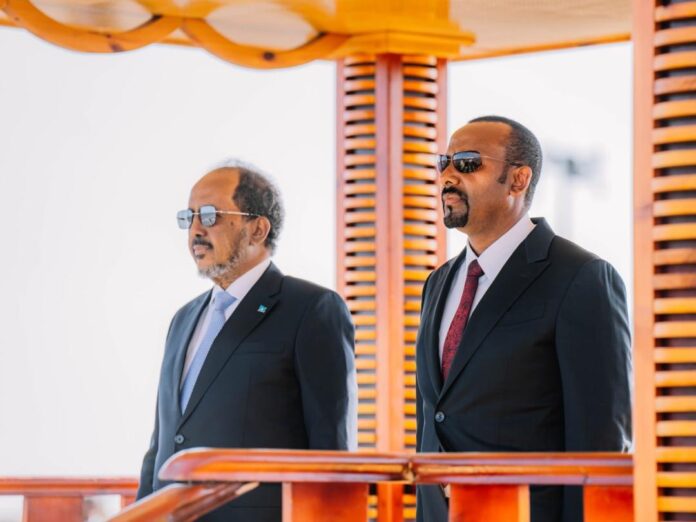ADDIS ABABA, Ethiopia (Kaab TV) – Ethiopia’s Prime Minister Abiy Ahmed and Somalia’s President Hassan Sheikh Mohamud have announced a renewed commitment to restore and enhance bilateral relations, marking the end of nearly a year-long deadlock between the two neighboring nations.
The agreement was revealed during President Hassan Sheikh’s working visit to Ethiopia on Saturday, January 11, 2025.
This significant development comes just weeks after the two leaders signed a Turkey-brokered agreement on December 11, 2024, which resolved tensions surrounding Ethiopia’s controversial Memorandum of Understanding (MoU) with Somaliland.
The MoU had proposed granting Ethiopia access to the Red Sea and establishing a military base, a move Somalia opposed, citing violations of its territorial integrity.
According to a one-page statement issued by the Ethiopian Prime Minister’s Office, the leaders agreed to fully restore diplomatic representation in their respective capitals, with ambassadors resuming posts in Mogadishu and Addis Ababa.
They also pledged closer cooperation in regional and multilateral forums to address shared challenges.
“The leaders reaffirmed that the stability of the region requires strong cooperation between the two countries based on mutual trust, confidence, and respect. They agreed to work together to further coordinate efforts to improve regional relations, fostering common understanding and shared progress,” the statement said.
Security and Economic Cooperation in Focus
Both leaders emphasized the importance of robust security collaboration to combat extremist militant groups threatening regional stability.

Somalia recently agreed to include Ethiopian forces in the newly-formed African Union peacekeeping mission, known as AUSSOM, which replaces ATMIS.
Economic cooperation was also a key focus, with agreements to expand infrastructure linkages aimed at boosting trade and investment.
The leaders reaffirmed their commitment to the Ankara Declaration, vowing to expedite technical negotiations to foster stronger partnerships.
Turkey’s role in facilitating the Ankara Declaration was highlighted, with Turkish President Recep Tayyip Erdoğan expected to visit Ethiopia and Somalia next month in a landmark trip to strengthen ties.
Turkey has deep connections with both nations, maintaining a large embassy and a military base in Mogadishu, and recently signing undisclosed military and oil agreements with Somalia.
Turkey is also one of Ethiopia’s largest foreign investors, with investments exceeding $2.5 billion across sectors like textiles, construction, and manufacturing.
Over 200 Turkish companies operate in Ethiopia, employing tens of thousands of locals.
Mixed Reactions in Somalia
While the joint communiqué was praised by Ethiopian officials and Somali diplomats as a milestone, it faced backlash in Mogadishu.
Some Somali Members of Parliament (MPs) criticized the agreement, calling President Hassan Sheikh a “traitor” and demanding his impeachment.
“The president did not inform Parliament about his trip to Addis Ababa. He failed to seek parliamentary approval to restore ties with Ethiopia, despite a January 2024 parliamentary resolution declaring Ethiopia an enemy state,” said MP Abdirahman Abdishakur, referring to a bill passed by Somalia’s Federal Parliament that banned diplomatic relations with Ethiopia.
Despite internal criticism, this agreement is seen as a step towards fostering peace, stability, and development in the Horn of Africa.
Commenting on the development, Somali State Minister for Foreign Affairs, Ali Omar, stated, “Through dialogue, trust, and mutual respect, Somalia and Ethiopia can overcome challenges and unlock a future of collaboration and progress for the Horn of Africa.”
Ethiopia’s State Minister for Foreign Affairs, Mesganu Arga Moach, echoed similar sentiments on X (formerly Twitter), calling the agreement “a big milestone forward in our bilateral and brotherly relations.”


